Mastering The Art Of Writing: Essential Dos And Donts
The Do’S And Don’Ts Of Writing A Book °。⋆ 🖇️ (My Top 5 *Must* Writing Tips)
Keywords searched by users: Do and don’ts of writing dos and don’ts of creative writing, dos and don’ts of writing an essay, do’s and don’ts examples, dos and don’ts of academic writing pdf, what is writing skill, Don ts in writing an essay, what are your weaknesses as a writer?, basic rules of academic writing
What Is Do’S And Don’Ts Essay Writing?
What is do’s and don’ts essay writing? Do’s and don’ts in essay writing refer to the recommended practices and things to avoid when composing an essay. To create an effective essay, it is advisable not to devote excessive time to crafting the introductory paragraph, as this can lead to disproportionate focus. Instead, aim for a concise and engaging introduction that sets the stage for your essay’s main points. Additionally, avoid overly broad generalizations at the beginning, as this can make your essay seem vague or unfocused. Instead, provide a clear and specific thesis statement to guide your reader. Furthermore, it is important to steer clear of lengthy narratives or anecdotes that may divert from your main argument and cause your essay to lose coherence. Finally, when it comes to the heading, refrain from using all capital letters, as this can be seen as visually jarring and is not in line with standard formatting conventions for essay titles.
What Should You Always Avoid In Writing?
“What are some common pitfalls to avoid when it comes to writing effectively? Here are some key tips for improving your writing:
-
Steer Clear of Alliteration: While alliteration can be a powerful stylistic tool, overusing it can make your writing sound forced and artificial. Use it sparingly to enhance your prose, but avoid excessive repetition of initial consonant sounds.
-
Mind Your Prepositions: Be cautious when ending sentences with prepositions. While this rule is not as strict as some might believe, it’s generally better to rephrase sentences to avoid this construction when possible.
-
Clichés: A Writer’s Nemesis: Clichés are like worn-out phrases that can dull your writing’s impact. Instead of resorting to these overused expressions, aim for fresh and original language that engages your readers.
-
Embrace the Vernacular: Connecting with your audience often requires using language that is relatable. Embrace the vernacular, or the everyday speech and expressions of your intended readers, to create a more authentic and relatable writing style.
-
Beware of Ampersands and Abbreviations: In formal writing, it’s generally best to avoid using ampersands (&) and excessive abbreviations. These can appear informal and disrupt the flow of your text.
-
Parenthetical Remarks with Caution: Parenthetical remarks, while occasionally relevant, can disrupt the flow of your writing. Use them sparingly and make sure they genuinely enhance the reader’s understanding.
-
Infinitives: To Split or Not to Split: The rule against splitting infinitives is not as strict as once believed. It’s often perfectly acceptable to split an infinitive when it improves clarity or readability.
-
Contraction Consideration: Contractions can add a conversational tone to your writing. While they may not be appropriate for all formal contexts, they can enhance readability and engagement in many cases.
By being mindful of these writing guidelines, you can enhance the clarity, effectiveness, and impact of your written communication.”
What Are The Rules To Write?
Understanding the Essential Rules and Tips for English Writing
When it comes to writing effectively in English, there are important rules and tips you should be aware of. These guidelines can significantly improve the clarity and quality of your writing.
-
Capitalization: Properly capitalize words to ensure clarity and correctness in your sentences.
-
Punctuation: Utilize commas and periods appropriately to enhance the flow and structure of your writing.
-
Verb Tenses: Ensure consistency in verb tenses throughout your text to avoid confusion.
-
Subject-Verb Agreement: Make certain that your subjects and verbs agree in number and person to maintain grammatical accuracy.
In addition to these fundamental rules, consider these valuable writing tips:
-
Homonyms: Be cautious of homonyms, words that sound alike but have different meanings, to prevent misunderstandings.
-
Specificity: Strive to be specific in your writing, providing details that enhance understanding and engagement.
-
Sentence Length: Break up lengthy sentences into smaller, more digestible segments to enhance readability.
-
Vocabulary: Use words you genuinely understand to convey your message effectively.
For those looking to apply these guidelines, mark your calendars for July 28, 2023, as we explore these English writing rules and tips in greater detail.
Share 47 Do and don’ts of writing



Categories: Summary 60 Do And Don’Ts Of Writing
See more here: danhgiadidong.net

Do not spend too much time on writing the introductory paragraph of the essay. Do not go too far generalizing the topic at the start. Refrain from narrating very long incidents or stories in the essay. Do not use all capital letters in the heading.There are no rules on how to write. There, I said it. Despite everything purveyors of writing advice (myself included) would like to tell you, there is no “correct” writing process. There is no right style or method.
- Avoid Alliteration. Always.
- Prepositions are not words to end sentences with.
- Avoid cliches like the plague. …
- Employ the vernacular.
- Eschew ampersands & abbreviations, etc.
- Parenthetical remarks (however relevant) are unnecessary.
- It is wrong to ever split an infinitive.
- Contractions aren’t necessary.
- Important English Writing Rules.
- Capitalize the right words. Add commas and periods where needed. Use the right tense. Make sure your subject and verb agree. …
- Useful English Writing Tips.
- Watch out for homonyms. Be specific. Break up long sentences. Only use words you understand.
| What not to do | What to do |
|---|---|
| Do not use bullet points or lists, unless it is in a report. | use complete sentences and link these into logical paragraphs. |
| Avoid making assumptions or giving your opinion (unless specifically asked). | Be objective. |
| Avoid waffling or repeating yourself. | Be clear and concise. |
Learn more about the topic Do and don’ts of writing.
- DOs & DON’Ts – Academic Writing in English
- Do’s and Don’ts of Essay Writing – GDPI Hitbullseye
- How to Write Good – Plain Language.gov
- 20 English Writing Rules and Tips to Instantly Improve Your Writing
- There Are No Rules on How to Write | by Mint Miller | Writers’ Blokke
- 25 Online Writing Dos & Don’ts to Support SEO – Search Engine Journal
See more: blog https://danhgiadidong.net/health
